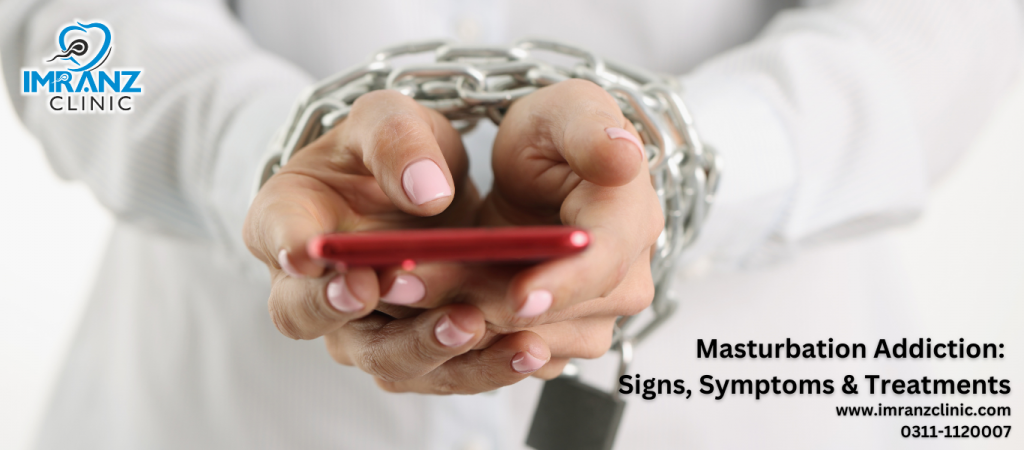Masturbation Addiction:
May 8, 2023, by Dr. Muhammad Imran Sheikh and Dr. Javed Iqbal
Signs, Symptoms and Treatments
Masturbation addiction is a complex condition in which someone develops a psychological, emotional, and physiological dependence on self-gratification. It is a chronic and progressive condition where people continue to masturbate despite personal and social consequences. Though chronic masturbation is treatable, many individuals are reluctant to seek treatment due to social stigma and personal shame.
Masturbation addiction happens when someone can no longer suppress their urges to masturbate and, consequently, compulsively engage in the behavior. Using the term “masturbation addiction” is controversial, as there is not significant enough research to support it being a standalone diagnosable condition. Many professionals refer to it as “compulsive masturbation,” which may occur as a symptom of other diagnosable disorders.3 Unfortunately, research is limited due to social stigma and personal shame.
Although masturbation is a healthy practice in moderation, excessive masturbation may bring with it many negative consequences.4 In either case, healthy or unhealthy, it is considered a relatively taboo topic, often due to the familial, societal, or religious shame associated with masturbation.2 One large survey revealed that 78% of adults masturbate.Regardless, the stigma has led those struggling with the condition to experience internalized messages of shame and sin surrounding masturbation.
What Is Considered Excessive Masturbation?
Masturbation is considered to be a problem when it starts to mirror other forms of behavioral addictions.
Signs of a masturbation problem might include:
- ·Masturbating takes up a lot of your time and energy
- ·Your home, work, or personal life is suffering because of masturbation
- ·You might be late to meetings, cancel events, or leave social appointments early to masturbate
- ·You masturbate in public or in uncomfortable places because you can’t wait to get home
- ·You masturbate even when you don’t feel aroused, sexual, or “horny.”
- ·When you feel negative emotions—such as anger, anxiety, stress, or sadness—your go-to response is to masturbate for comfort
- ·You feel guilty, distressed, or upset after masturbating
- ·You masturbate even if you don’t want to
- ·You find it difficult to stop thinking about masturbation
- ·When not masturbating, you experience craving or withdrawal symptoms
Is chronic masturbation bad for you?
Masturbation is a natural behavior, and in moderation, it can even have positive mental and physical health effects. However, overdoing it can be bad for you.
Excessive masturbation side effects might include:
- ·Low self-esteem
- ·Low sexual satisfaction with partners
- ·Inhibits other healthy coping mechanisms
- ·Interferes with interpersonal connections
Causes of Masturbation Addiction
Like its symptoms, the causes and triggers of masturbation addiction will vary by individual. Again, these may be effected by personal predispositions and social influences. The more causes and triggers that are present in someone’s life, the greater the potential susceptibility. With an awareness of these risk factors, more proactive measures may be taken to prevent a problem.
Here are several causes and risk factors for compulsive sexual behavior:
- ·An imbalance of natural brain chemicals
- ·Changes in brain pathways
- ·Conditions that affect the brain
- ·Ease of access to sexual content
- ·Alcohol or drug abuse problems
- ·Another mental health condition
- ·Family conflicts or family members with problems such as addiction
- ·A history of physical or sexual abuse
How to Stop a Masturbation Addiction
With a proper recovery and maintenance process, it’s possible to stop compulsive masturbation. Though there is no cure—and again, you must remain consistent and intentional—the rewards of recovery may lead toward a fulfilling, successful life without the constant associated urges and behaviors. We are offering in our center Imranz Clinic with expert consultants (Dr. Muhammad Imran Sheikh and Dr. Javed Iqbal ) better treatment to recover your energy and future happiness with healthy relations.


